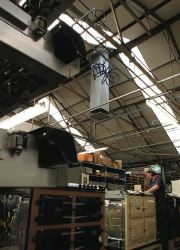Evaporative cooling overcomes Aga’s overheating problem

Evaporative cooling using four Breezair units has reduced temperature in the Telford factory of Aga from over 30°C to less than 25°C.
Aga, which makes the cast-iron Aga cooker, has overcome the problem of temperatures in its factory at Telford exceeding 30°C by installing a Breezair evaporative air-cooling system. It has reduced the temperature to less than 25°C. A 50% increase in sales in three years necessitated Aga converting a stores area into a further assembly facility. With no natural ventilation, the area become a heat trap. Aware that Airplants had already supplied roof-mounted and mobile Breezair units to the company’s foundry at Coalbrookedale, engineering-service manager David Hodson asked the company to carry out a site survey to see if the Breezair system would be suitable for the assembly area. The detailed review observed that the 840 m2 are has a 6 m-high apex roof where heat collected. Heat then radiated down to the interior of the building, causing the temperature of the entire space to rise. At the same time, people, equipment and machinery were also heating the enclosed air, so that the temperature in the building exceeded the ambient of 21°C by about 10 K. Four Breezair units were installed on the roof, strategically placed to provide spot cooling around the assembly area. David Hodson said, ‘Not only is Breezair far cheaper to install than other products, it is also low maintenance and environmentally friendly. The workforce is absolutely delighted with the improved working conditions.’
Related links:


